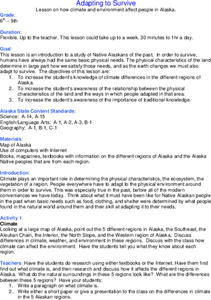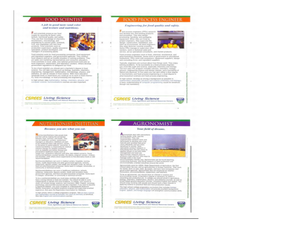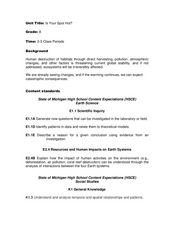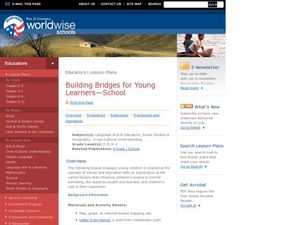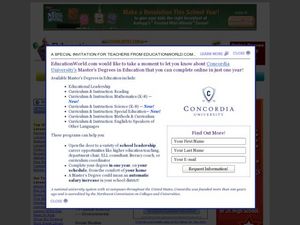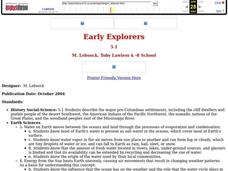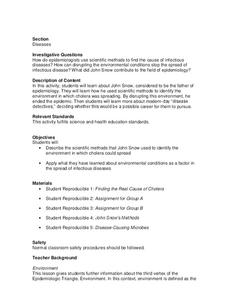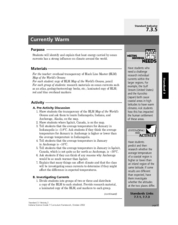Curated OER
Living During the Little Ice Age
Students brainstorm what living conditions during the period known as the Little Ice Age (1350-1850) might have been like. They research lifestyles, the economy, crop yields, and human and livestock mortality.
Curated OER
A World of Favorites
Investigate students' favorites worldwide by having them create and publish a questionnaire to gather information about students' favorites. They will conduct research about a continent, create three web pages and a chart representing...
Curated OER
Location of Cities 201
Students work in pairs to locate the ancient cities on a world atlas using the longitude and latitude measurements. They examine the physical and human futures that explain their locations.
Curated OER
Adapting to Survive
Students examine how the climate and environment affect people in Alaska. They identify the five regions of Alaska on a map, conduct Internet research, write a report on the climate differences in the five Alaskan regions, and write a...
Curated OER
Dreaming of a Healthy City
Ninth graders design a healthy city. They identify the essential elements of a city and describe how climate and geography can determine the layout of a city. They create a blueprint of their design and share in small groups.
Curated OER
Lesson: Journey of a Tree
Third graders explore the operation of a Christmas farm and how trees are shipped. After taking a tour of a Christmas tree farm and researching transportation, location and cost issues, 3rd graders create a map to show the distribution...
Curated OER
Cultures and Cuisines WebQuest
Learners create and present a powerpoint presentation. In this cultures and cuisines research lesson, students select a country, interview someone from that country and visit a restaurant from that country. Learners complete research...
Curated OER
Frozen Out
Students investigate how climate changes affect top predators in Arctic marine ecosystems. Students complete a worksheet and write a report based on their responses to a scientific paper.
Curated OER
Michigan Food: From Farm to You
Students recognize Michigan on a map and understand how its climate is affected by the Great Lakes. In this Michigan food lesson, students play a trivia game to identify the produce of Michigan. Students relate the climate in each part...
Curated OER
GEOGRAPHY: SPACE CENTERS
Young scholars examine the descriptive science dealing with the surface of Earth, its division into continents and countries, climate, natural resources, inhabitants and industries of the various divisions and analyze the political...
Curated OER
Off to the Future
Students read a handout and predict the position of the San Andreas Fault far in the future. In this future world lesson, students use a map worksheet to demonstrate the path of the Pacific Plate millions of years from now.
Curated OER
Biomimicry, Nature: Architecture of the Future
Students explore the relationship between nature and architecture. In this cross curriculum history, culture, and architecture lesson, students observe and discuss structures visible in nature. Students view websites in which Native...
Curated OER
Is Your Spot Hot?
Eighth graders explore global warming. In this Earth Science lesson plan, 8th graders will look for Harbingers and fingerprints for different areas. The students will identify an area at risk and they will then create a presentation to...
Curated OER
Ireland: the Emerald Isle
Third graders complete a unit of study that examines several perspectives of Ireland. They explore how climate shapes Irish culture, reference historical and political maps, compute exchange values for Irish money, complete worksheets,...
Curated OER
Building Bridges for Young Learners- School
Young scholars examine the purpose of education. In this schooling lesson, students read a letter from a child in Uzbekistan. Young scholars compare and contrast their schooling to children around the world.
Curated OER
New Food Saves Lives, Could End Hunger
Students locate the country of Niger, then read a news article about a new type of food that is being used to fight childhood hunger in Africa. In this current events lesson, the teacher introduces the article with map and vocabulary...
Curated OER
Early Explorers
Fifth graders study early explorers. For this World history lesson, 5th graders draw an outline of a map labeling each part, build geographical features out of dough, and paint each of the land and water features.
Curated OER
Chart the Weather for Cities Around the World
Students orally describe Northern and Southern hemispheres, identify 7 continents, and point out specific countries and cities. They locate and record weather information.
EduGAINs
Migration—Push and Pull Factors
What causes people to move from one place, one city, or one country to another? Using the provided migration questionnaire, learners interview family members about the factors that cause them to be pushed from an area or pulled to an area.
Centers for Disease Control and Prevention
Diseases
During a cholera outbreak, scientists presented two theories; one theory was based on miasma and the other on germs and contaminated water. The instructional activity looks at the scientific process for finding the real culprit.
Curated OER
Help Save the Polar Bear
Students use ice cubes to demonstrate how the polar ice caps are melting and how it effects the polar bears. In this polar bear lesson plan, the teacher explains how polar bears live on the north pole and how they are having trouble due...
Curated OER
Travel Brochure/ Itinerary
Students select and research a country of their choice and create a travel brochure and a 7-day itinerary.
Curated OER
At Your Fingertips
First graders observe a variety of different foods including kiwi, banbnas, coffee, chocolate and discuss where they come from. They discuss the terms import and export then identify the locations where the items came from and their...
Curated OER
Currently Warm
Seventh graders investigate how ocean currents affect climate. In this earth science lesson, 7th graders draw and label the current in their assigned ocean. They discuss how currents from the poles differ from the equator.





